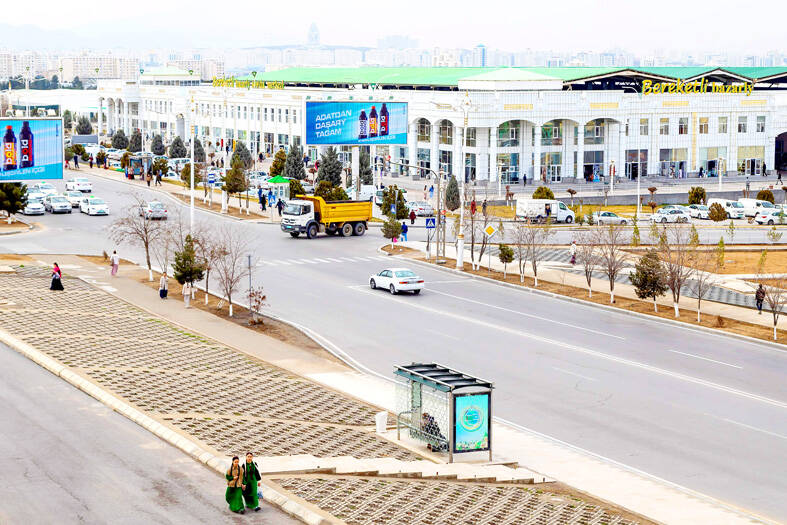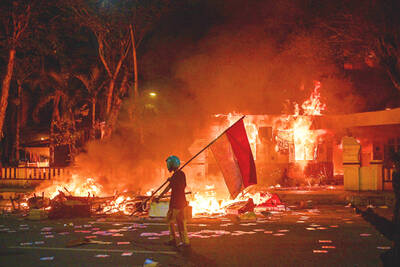Mekhri feels “a sense of freedom and self-confidence” when she is behind the wheel of a car — despite being forced to drive illegally because of an unwritten rule preventing women getting a license.
In Turkmenistan, the reclusive central Asian state where she lives, young women are effectively banned from driving.
“I know the rules of the road. I drive calmly, don’t overtake anyone and know how to park,” the 19-year-old said.

Photo: AFP
Like other women interviewed by Agence France-Presse in Turkmenistan — ranked by rights groups as one of the most closed and repressive countries in the world — she withheld her surname.
There is no legislation specifically outlawing women under 30 from obtaining a driving license. However, it is one of many informal prohibitions that is universally followed, so women that do drive must do so without this precious permit, which is indeed against the law.
“When my daughter wanted to enroll at the driving school, we were told that she could take lessons, but that she would probably not pass the test,” said Guzel, Mekhri’s 57-year-old mother.
So instead of paying for lessons, Guzel assumed the role of instructor and now takes Mekhri outside the capital, Ashgabat, to practice.
“Where there are few cars, police officers and cameras, I let my daughter take the wheel and I teach her,” said Guzel, who started driving when she was 40.
Among the other transport-related diktats imposed by father-and-son duo Gurbanguly and Serdar Berdymukhamedov — who have ruled the country one after the other since 2006 — are a ban on black cars.
Owners have been forced to paint the vehicles white, the favorite color of Gurbanguly, whose official titles are “Hero-Protector” and “leader of the Turkmen nation.”
Many young women share Mekhri’s frustration.
“I wanted to take my test at 18. At the driving school, the instructor immediately warned the many girls there: ‘You’ve come for nothing. You won’t be able to take it,” said Maisa, a 26-year-old saleswoman.
“But up to the exam, driving schools take both boys and girls, because they pay,” she said.
Goulia, 19, said her parents had wanted to buy her a car when she went to university so she could be more independent, do the family shopping and take her grandmother to hospital and the chemist’s.
“But because of the difficulties that girls like me face getting a driver’s license, my mother said she would have to postpone the decision,” she said.
“I’ve just turned 19 and I can’t get a license, but the boys can and I don’t understand why,” she added.
Turkmenistan’s motor transport agency did not respond to a request for comment.
Contacted via phone by AFP, one driving school said: “Women have the right to enrol in the course and take the exam” before abruptly hanging up.
However, another instructor from Ashgabat acknowledged the informal ban.
“It is due to a sharp increase in accidents involving female drivers,” the instructor said, speaking on condition of anonymity.
“After an investigation by the authorities, it turned out they were simply buying driving licenses,” the instructor said — a claim AFP could not verify.
Rules have also been tightened for women over 30 who are not covered by the informal ban.
To register a car in their own name, they have to show a marriage certificate, family record book and a report from their employer.
Authorities routinely reject accusations that they are restricting women’s rights.
Responding to a recent UN report criticizing the country, the government said: “The motherland treats mothers and women with great respect.”
Ahead of International Women’s Day last Saturday, President Serdar Berdymoukhamedov gifted every woman the equivalent of US$3 — enough to buy a cake or 6kg of potatoes.

Australia has announced an agreement with the tiny Pacific nation Nauru enabling it to send hundreds of immigrants to the barren island. The deal affects more than 220 immigrants in Australia, including some convicted of serious crimes. Australian Minister of Home Affairs Tony Burke signed the memorandum of understanding on a visit to Nauru, the government said in a statement on Friday. “It contains undertakings for the proper treatment and long-term residence of people who have no legal right to stay in Australia, to be received in Nauru,” it said. “Australia will provide funding to underpin this arrangement and support Nauru’s long-term economic

‘NEO-NAZIS’: A minister described the rally as ‘spreading hate’ and ‘dividing our communities,’ adding that it had been organized and promoted by far-right groups Thousands of Australians joined anti-immigration rallies across the country yesterday that the center-left government condemned, saying they sought to spread hate and were linked to neo-Nazis. “March for Australia” rallies against immigration were held in Sydney, and other state capitals and regional centers, according to the group’s Web site. “Mass migration has torn at the bonds that held our communities together,” the Web site said. The group posted on X on Saturday that the rallies aimed to do “what the mainstream politicians never have the courage to do: demand an end to mass immigration.” The group also said it was concerned about culture,

ANGER: Unrest worsened after a taxi driver was killed by a police vehicle on Thursday, as protesters set alight government buildings across the nation Protests worsened overnight across major cities of Indonesia, far beyond the capital, Jakarta, as demonstrators defied Indonesian President Prabowo Subianto’s call for calm. The most serious unrest was seen in the eastern city of Makassar, while protests also unfolded in Bandung, Surabaya, Solo and Yogyakarta. By yesterday morning, crowds had dispersed in Jakarta. Troops patrolled the streets with tactical vehicles and helped civilians clear trash, although smoke was still rising in various protest sites. Three people died and five were injured in Makassar when protesters set fire to the regional parliament building during a plenary session on Friday evening, according to

CRACKDOWN: The Indonesian president vowed to clamp down on ‘treason and terrorism,’ while acceding to some protest demands to revoke lawmaker benefits Protests in Indonesia over rising living costs and inequality intensified overnight, prompting Indonesian President Prabowo Subianto to cancel a planned trip to China, while demonstrators reportedly targeted the homes of the finance minister and several lawmakers. Rioters entered Indonesian Minister of Finance Sri Mulyani Indrawati’s residence near Jakarta early yesterday, but were repelled by armed forces personnel, Kompas reported. Items were taken from the homes of lawmaker Ahmad Sahroni and two others, according to Detik.com. The reports of looting could not be independently verified, and the finance ministry has not responded to requests for comment. The protests were sparked by outrage over